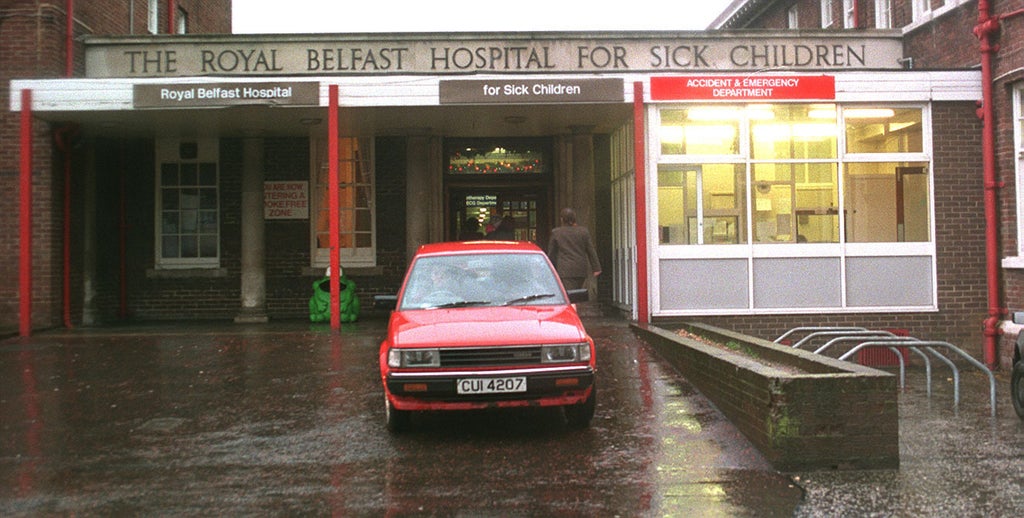
The parents of a nine-year-old girl said they had trusted a doctor who 26 years later is accused of covering up her death, a tribunal has heard.
Dr Heather Steen is said by the General Medical Council (GMC) to have concealed the true circumstances of Claire Roberts’ death to “avoid scrutiny” of failings in her care.
On Thursday, Alan Roberts told a fitness to practise hearing that Dr Steen said an inquest was not required after his daughter’s life support was switched off at Royal Belfast Hospital for Sick Children in the early hours of October 23 1996.
Claire was admitted 33 hours earlier after she was sent home from school and was later sick.
We were putting our trust and guidance in Dr Steen. We never questioned Claire’s diagnosis or her understanding of what had gone terribly wrong with Claire
Her family GP recommended they go to hospital where she was kept in overnight for observations.
Mr Roberts and his wife, Jennifer, were under the impression from medics she had a tummy bug but were called back to hospital when she had breathing difficulties.
The GMC says Dr Steen knew Claire had suffered acute hyponatraemia – a condition which occurs when there is a shortage of sodium in the bloodstream – but failed to mention it when she spoke to them in a side office after the death.
Instead, she said a virus had spread from her stomach to her brain which had caused it to swell and nothing more could have been done by the hospital, the Medical Practitioners Tribunal Service (MPTS) hearing has been told.
Mr Roberts said: “Dr Steen was quite clearly telling my wife and I that there was no need for an inquest. We had a very vague understanding of what an inquest entailed.
“We were putting our trust and guidance in Dr Steen. We never questioned Claire’s diagnosis or her understanding of what had gone terribly wrong with Claire.”
Kevin McCartney, representing Dr Steen, said it is her case that she has no real, or clear, recollection of the conversation but her usual practice in similar situations was not to use the word “inquest”.
Mr Roberts told the MPTS panel the first time he had heard of hyponatraemia was in 2004 when a UTV documentary was broadcast which featured the deaths of three children and linked it with fluid mismanagement by hospitals.
The programme led to the launch of a public inquiry into hyponatraemia-related deaths in Northern Ireland.
In December 2004, the Roberts met Dr Steen and other hospital officials to discuss their concerns.
But Mr Roberts told the MPTS it was merely a “repeat” of the 1996 discussion and again the consultant paediatrician told them a virus caused Claire’s death.
Tom Forster, for the GMC, asked: “Did she make any concession about fluid management being part of the problem?”
Mr Roberts replied. “No, Dr Steen did not make a concession. I feel she elaborated on the possibility that there was no correlation between fluid management and Claire’s death.
“I think the general feeling we had was that Dr Steen was attempting to dissuade us from taking Claire’s case any further.”
Dr Steen went on to give evidence in 2006 at Claire’s inquest which concluded she died from a virus.
Mr Forster said: “Did Dr Steen say anything to the coroner about the role of fluid management in Claire’s death?”
Mr Roberts said: “Dr Steen was quite clear that Claire’s fluid management was normal.”
Mr Forster went on: “Did Dr Steen inform the coroner that any errors had occurred in Clare’s care? “
Mr Roberts replied: “No she did not.”
The doctor denies allegations she acted dishonestly and engaged in a cover-up.
In 2018, the hyponatraemia public inquiry concluded Claire died from “negligent care” after an overdose of fluids and medication.
A fresh inquest in 2019 ruled her death was “caused by the treatment she received in hospital”.
The hearing continues.







